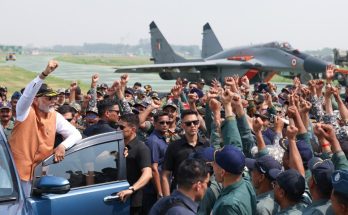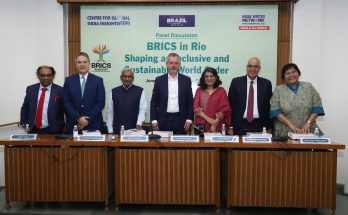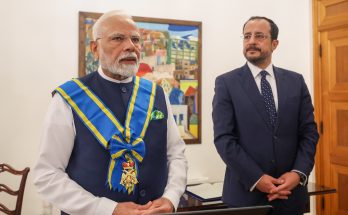
Initial anxieties about how President Donald Trump’s volatile policy postures and nationalist agenda will impact the India-US relations have now become muted. PM Modi’s visit to the US, followed by Washington’s greater receptivity towards New Delhi’s concerns on terrorism and Afghanistan, has infused a new dynamism in India-US relations, says Meera Shankar, India’s former ambassador to the US in an article written exclusively for India and World, a pioneering magazine focused on international relations
The election of Donald Trump as President of America brought new uncertainties in India-US relations. His “America First” approach and call for strong trade action to protect American jobs from being shipped overseas promised fresh trade frictions and the lack of clarity on the US’s role in the Asia-Pacific raised questions whether the Strategic Partnership would be diluted in favour of a more transactional approach. Today, eight months down the road and following Prime Minister Modi’s visit to the US in June, 2017, the India-US Partnership is on course, centred on shared interests in countering terrorism, managing a more assertive China and shaping a balance conducive to peace and stability in the broader Asia-Pacific region.
Today, months down the road and following Prime Minister Modi’s visit to the US in June, 2017, the India-US Partnership is on course, centred on shared interests in countering terrorism, managing a more assertive China and shaping a balance conducive to peace and stability in the broader Asia-Pacific region.
Afghanistan Connect
This was dramatically underlined in President Trump’s articulation of his new policy on Afghanistan and South Asia in which he agreed to (reluctantly) increase US troops in Afghanistan. He also made it clear that the US policy would not be based on timelines for withdrawal but on conditions on the ground and vowed to remove operating restrictions on US troops and expand authority for counter-terrorist operations. He reaffirmed the continued commitment to build Afghan capabilities and warned Pakistan to act against terrorist safe havens there, cautioning that “no partnership can survive a country’s harbouring of militants and terrorists who target US Service members”. There were, however, few details on how the US will concretise its new approach to Pakistan and what instruments it will use.
Strengthening the US’ strategic partnership with India would be a key element of the new policy. Trump called on India to play a bigger role in Afghanistan, especially in the field of economic assistance and development. He declared the US commitment to work together with India for “pursuing their shared objectives for peace and security in South Asia and the broader Indo-Pacific region”. Coming, as this did, after prolonged silence on Afghanistan and President Trump’s declared scepticism on military entanglements abroad, the policy brought new clarity in the Trump Administration’s approach. This has been welcomed by the Indian government which has been concerned that a vacuum in Afghanistan, and the resultant chaos, could lead to a sharp resurgence in jihadi forces there.
New Vistas: 2+2 Dialogue
The Afghan policy followed the announcement that India and the US would enhance their Strategic Dialogue through a new 2+2 format, possibly hiving off the Commercial Dialogue as a separate forum.
Counter-terrorism cooperation has strengthened in recent years, focussing on better sharing of information and intelligence cooperation, capacity building and technology up-gradation. A process of consultations on designation of terrorist organisations has been put in place. The Trump administration has been far more forthcoming on India’s concerns. The US has, for the first time, designated a Kashmir centric group, Hizb-ul-Mujahideen, and its leader, Syed Salahuddin, as a foreign terrorist organisation. Apart from the financial sanctions that this would entail on the part of the US, of significance is the removal of the cloak of political legitimacy which the Hizb claimed for its acts of terrorism in Jammu and Kashmir.
Defence Ties Phase II
The defence sector has emerged as one of the most promising areas of cooperation. The Indian defence forces undertake more military exercises with the US than with any other country. This year’s Malabar naval exercise was more complex and involved the navies of three countries: India, the US and Japan. India’s defence purchases from the US have been growing and are around $14 billion. As orders in the pipeline fructify this is poised to touch $19 billion. Indeed, India is now one of the largest purchasers of US equipment.
Strengthening the US’ strategic partnership with India would be a key element of the new policy. Trump called on India to play a bigger role in Afghanistan, especially in the field of economic assistance and development. He declared the US commitment to work together with India for “pursuing their shared objectives for peace and security in South Asia and the broader Indo-Pacific region”.
More important, from India’s point of view, is the US willingness to look beyond a buyer-seller relationship to a partnership for joint development and joint production under the Defence Technology and Trade Initiative (DTTI).
Maritime Security
India and the US share the objective of keeping open the sea-lanes which are the arteries of trade. The conclusion, in 2016, of a White Shipping Agreement between India and the US and the Memorandum on Logistics Exchange (LEMOA) provide a framework for strengthening their cooperation. A Maritime Security Dialogue has been initiated with counter piracy, counter terrorism, counter proliferation, humanitarian assistance and disaster relief identified as potential areas of cooperation.
The Trump administration has been far more forthcoming on India’s concerns. The US has, for the first time, designated a Kashmir centric group, Hizb-ul-Mujahideen, and its leader, Syed Salahuddin, as a foreign terrorist organisation.
Protectionist anxieties
Trade and economic cooperation have been key drivers of India-US relations. The US is India’s largest trading partner with trade in goods and services touching $114 billion in 2016. The US is one of the major investors in India with cumulative investment of US $28 billion, according to US data. Investment from Indian companies in the US has been growing at a fast pace, touching $17 billion, according to Indian data. The US is also the largest source of financial and technical collaborations for Indian companies.
The Trump Administration has upended the Republican Party’s traditional commitment to free trade in favour of a more nationalist and protectionist approach and this is an area of potential friction. There are differences over market access, intellectual property and movement of skilled personnel.
India and the US have divergent approaches on several global issues flowing from their different levels of economic and social development. President Trump has walked out of the Paris Accord on Climate Change. Ironically, however, given the Trump Administration’s more inward focus, the salience of differences over several of these issues should reduce. President Trump has reiterated the US support for India’s permanent membership of the UN Security Council which President Obama had declared in 2010. The US also continues to support India’s membership of the NSG, Australia Group and Wassenaar Arrangement. India has already become a member of the Missile Technology Control Regime with the US support. These processes should be taken to conclusion to facilitate India’s full integration in global security systems.
The India-US relationship is not limited to the two governments, but is people-centric with the 4 million Indian American community providing a vital bridge in widening the links between the two countries. Talented Indian Americans are not only contributing to innovation and economic growth in America, but are increasingly playing a larger role in US public life.
Convergent Interests
Broadly, President Trump is carrying forward the India-US Strategic Partnership. Initial concerns about how his nationalistic and often unorthodox agenda would impact on bilateral relations have been quietened. Prime Minister Modi and President Trump have established a good personal equation. Increasingly convergent interests in peace and security in Asia and shared democratic values shape this relationship which enjoys support across the political spectrum in the US and broad political support in India. This should help to cushion and steady the relationship as the US confronts increasing political divisions at home.
The Trump administration has reaffirmed this decision as also the continuation of the DTTI. However, progress under the DTTI has so far been hamstrung in the absence of appointment of officials on the US side to carry it forward. Helping to build India’s domestic defence manufacturing capabilities is a win-win proposition for both countries and needs to be pursued with greater energy and focus.
Prime Minister Modi and President Trump have established a good personal equation. Increasingly convergent interests in peace and security in Asia and shared democratic values shape this relationship which enjoys support across the political spectrum in the US and broad political support in India. This should help to cushion and steady the relationship as the US confronts increasing political divisions at home.
(Meera Shankar served as India’s Ambassador to the US and Germany. She was India’s second female ambassador to the US).
- To read the full article, subscribe to India and World magazine, write to editor@indiawrites.org, indiaandworld@hotmail.com
Author Profile
- India Writes Network (www.indiawrites.org) is an emerging think tank and a media-publishing company focused on international affairs & the India Story. Centre for Global India Insights is the research arm of India Writes Network. To subscribe to India and the World, write to editor@indiawrites.org. A venture of TGII Media Private Limited, a leading media, publishing and consultancy company, IWN has carved a niche for balanced and exhaustive reporting and analysis of international affairs. Eminent personalities, politicians, diplomats, authors, strategy gurus and news-makers have contributed to India Writes Network, as also “India and the World,” a magazine focused on global affairs.
Latest entries
 India and the WorldJune 26, 2025Operation Sindoor: India Sheds Restraint, Rediscovers Utility of Force
India and the WorldJune 26, 2025Operation Sindoor: India Sheds Restraint, Rediscovers Utility of Force India and the WorldJune 23, 2025BRICS summit in Rio to focus on Global South, local currency trade
India and the WorldJune 23, 2025BRICS summit in Rio to focus on Global South, local currency trade Africa InsightsJune 11, 2025New Opportunities in India-Japan Cooperation in Africa
Africa InsightsJune 11, 2025New Opportunities in India-Japan Cooperation in Africa India and the WorldMay 23, 2025Post-Operation Sindoor, India reminds Turkey, China of concerns and sensitivities
India and the WorldMay 23, 2025Post-Operation Sindoor, India reminds Turkey, China of concerns and sensitivities







